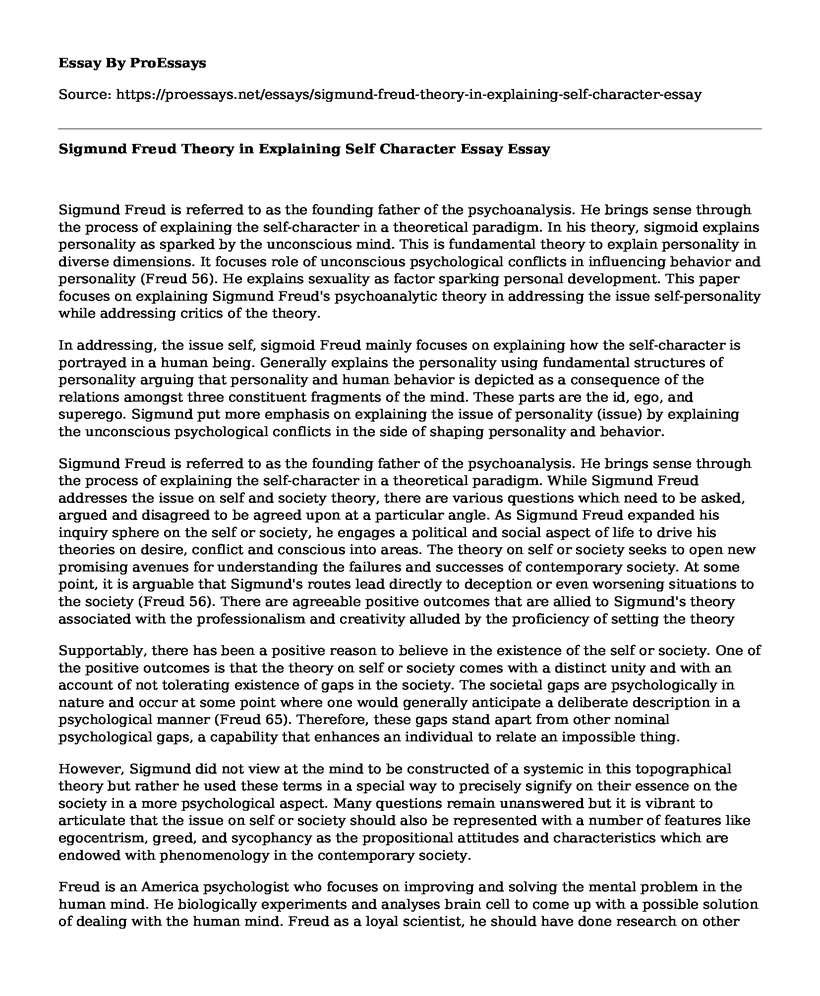Sigmund Freud is referred to as the founding father of the psychoanalysis. He brings sense through the process of explaining the self-character in a theoretical paradigm. In his theory, sigmoid explains personality as sparked by the unconscious mind. This is fundamental theory to explain personality in diverse dimensions. It focuses role of unconscious psychological conflicts in influencing behavior and personality (Freud 56). He explains sexuality as factor sparking personal development. This paper focuses on explaining Sigmund Freud's psychoanalytic theory in addressing the issue self-personality while addressing critics of the theory.
In addressing, the issue self, sigmoid Freud mainly focuses on explaining how the self-character is portrayed in a human being. Generally explains the personality using fundamental structures of personality arguing that personality and human behavior is depicted as a consequence of the relations amongst three constituent fragments of the mind. These parts are the id, ego, and superego. Sigmund put more emphasis on explaining the issue of personality (issue) by explaining the unconscious psychological conflicts in the side of shaping personality and behavior.
Sigmund Freud is referred to as the founding father of the psychoanalysis. He brings sense through the process of explaining the self-character in a theoretical paradigm. While Sigmund Freud addresses the issue on self and society theory, there are various questions which need to be asked, argued and disagreed to be agreed upon at a particular angle. As Sigmund Freud expanded his inquiry sphere on the self or society, he engages a political and social aspect of life to drive his theories on desire, conflict and conscious into areas. The theory on self or society seeks to open new promising avenues for understanding the failures and successes of contemporary society. At some point, it is arguable that Sigmund's routes lead directly to deception or even worsening situations to the society (Freud 56). There are agreeable positive outcomes that are allied to Sigmund's theory associated with the professionalism and creativity alluded by the proficiency of setting the theory
Supportably, there has been a positive reason to believe in the existence of the self or society. One of the positive outcomes is that the theory on self or society comes with a distinct unity and with an account of not tolerating existence of gaps in the society. The societal gaps are psychologically in nature and occur at some point where one would generally anticipate a deliberate description in a psychological manner (Freud 65). Therefore, these gaps stand apart from other nominal psychological gaps, a capability that enhances an individual to relate an impossible thing.
However, Sigmund did not view at the mind to be constructed of a systemic in this topographical theory but rather he used these terms in a special way to precisely signify on their essence on the society in a more psychological aspect. Many questions remain unanswered but it is vibrant to articulate that the issue on self or society should also be represented with a number of features like egocentrism, greed, and sycophancy as the propositional attitudes and characteristics which are endowed with phenomenology in the contemporary society.
Freud is an America psychologist who focuses on improving and solving the mental problem in the human mind. He biologically experiments and analyses brain cell to come up with a possible solution of dealing with the human mind. Freud as a loyal scientist, he should have done research on other possible problems which are likely to be encountered by human beings like finding cures for certain diseases and ways of coming up with possible solutions of controlling it. He again did not explain the meaning of mental conscious to people but instead, he left them to believe on assumptions that all mental statues are conscious alone and will take a higher doubtful stand for one to regain normal behavior after recovering from it. He, however, introduced the theory of unconscious which had both negative and positive repercussion on western culture and humanity. He greatly supported the westernization without considering the negative impact it has to the society. For instance, there was the introduction of new ways of dressing in both boys and girls especially those from universities which at long last hinders traditional ways of dressing in the society (Freud 61). Today even parents have followed the new modern way of dressing to an extent that one cannot differentiate both young girl and boy from their parents without keen observation. It's so unfortunate that people have left their traditions and got the new stand on modern things.Conclusion
In conclusion, Freud did not look at mind to be a build-up in a systematic way in explaining his topographical model. . At last Freud left many questions unanswered in his documentary and concluded that consciousness and unconsciousness are both set figurative content which discriminates singular features which need to be compared with certain attitude whether good or bad
Works Cited
Freud, Sigmund. Civilization and its discontents. Broadview Press, 2015.
Cite this page
Sigmund Freud Theory in Explaining Self Character Essay. (2022, Feb 28). Retrieved from https://proessays.net/essays/sigmund-freud-theory-in-explaining-self-character-essay
If you are the original author of this essay and no longer wish to have it published on the ProEssays website, please click below to request its removal:
- Personal Success Essay
- Hypothesis, Theory and Variables Essay
- Paranoid Schizophrenia Treatment Goals
- The Relationship Between Depressive and Physical Activity Paper Example
- Paper Example on Case Manager & Client: Achieving Mental Health Goals Together
- Essay Example on My Learning Journey: Taking Responsibility & Improving Myself
- Paper Example on Age-Related Changes: Nutritional Challenges & Health Risks







